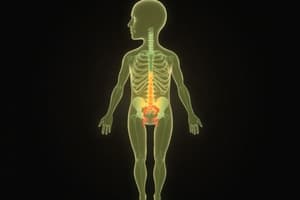Podcast
Questions and Answers
What is the endocrine system?
What is the endocrine system?
- A collection of bones
- A collection of muscles that contract
- A collection of cells that secrete hormones (correct)
- A collection of nerves that transmit signals
What are hormones?
What are hormones?
Chemical messengers of the endocrine system released into the blood.
What are protein hormones?
What are protein hormones?
A class of hormones that cannot pass through the cell membrane.
What are steroid hormones?
What are steroid hormones?
What are prostaglandins?
What are prostaglandins?
What is positive feedback?
What is positive feedback?
What is negative feedback?
What is negative feedback?
What is the one messenger model?
What is the one messenger model?
What is the two messenger model?
What is the two messenger model?
What is hypersecretion?
What is hypersecretion?
What is hyposecretion?
What is hyposecretion?
What is the function of the pituitary gland?
What is the function of the pituitary gland?
What does growth hormone do?
What does growth hormone do?
What is luteinizing hormone?
What is luteinizing hormone?
What is prolactin?
What is prolactin?
What is follicle stimulating hormone?
What is follicle stimulating hormone?
What does adrenocorticotropic hormone do?
What does adrenocorticotropic hormone do?
What is oxytocin responsible for?
What is oxytocin responsible for?
What role does antidiuretic hormone play?
What role does antidiuretic hormone play?
What does the hypothalamus do?
What does the hypothalamus do?
What is acromegaly?
What is acromegaly?
What is the thyroid gland responsible for?
What is the thyroid gland responsible for?
What does calcitonin do?
What does calcitonin do?
What is the role of parahormone?
What is the role of parahormone?
What is tetany?
What is tetany?
What is osteoporosis?
What is osteoporosis?
What is the adrenal gland?
What is the adrenal gland?
What does the cortex of the adrenal gland do?
What does the cortex of the adrenal gland do?
What is the function of the medulla in the adrenal gland?
What is the function of the medulla in the adrenal gland?
What does cortisol do?
What does cortisol do?
What is aldosterone?
What is aldosterone?
What is Cushing syndrome?
What is Cushing syndrome?
What is the pancreas?
What is the pancreas?
What is the function of insulin?
What is the function of insulin?
What does glucagon do?
What does glucagon do?
What is diabetes?
What is diabetes?
What is estrogen?
What is estrogen?
What is progesterone?
What is progesterone?
What does testosterone promote?
What does testosterone promote?
What is the pineal gland?
What is the pineal gland?
What does melatonin regulate?
What does melatonin regulate?
What is the thymus gland's role?
What is the thymus gland's role?
Flashcards
Endocrine System
Endocrine System
A system of glands that release hormones into the bloodstream to regulate body functions.
Hormones
Hormones
Chemical messengers that regulate body functions.
Protein Hormones
Protein Hormones
Hormones that cannot cross cell membranes and use membrane receptors.
Steroid Hormones
Steroid Hormones
Signup and view all the flashcards
Prostaglandins
Prostaglandins
Signup and view all the flashcards
Positive Feedback
Positive Feedback
Signup and view all the flashcards
Negative Feedback
Negative Feedback
Signup and view all the flashcards
One Messenger Model
One Messenger Model
Signup and view all the flashcards
Two Messenger Model
Two Messenger Model
Signup and view all the flashcards
Hypersecretion
Hypersecretion
Signup and view all the flashcards
Hyposecretion
Hyposecretion
Signup and view all the flashcards
Pituitary Gland
Pituitary Gland
Signup and view all the flashcards
Growth Hormone
Growth Hormone
Signup and view all the flashcards
Luteinizing Hormone
Luteinizing Hormone
Signup and view all the flashcards
Prolactin
Prolactin
Signup and view all the flashcards
Follicle Stimulating Hormone
Follicle Stimulating Hormone
Signup and view all the flashcards
Adrenocorticotropic Hormone
Adrenocorticotropic Hormone
Signup and view all the flashcards
Oxytocin
Oxytocin
Signup and view all the flashcards
Antidiuretic Hormone
Antidiuretic Hormone
Signup and view all the flashcards
Thyroid Gland
Thyroid Gland
Signup and view all the flashcards
Calcitonin
Calcitonin
Signup and view all the flashcards
Parathyroid Hormone
Parathyroid Hormone
Signup and view all the flashcards
Tetany
Tetany
Signup and view all the flashcards
Osteoporosis
Osteoporosis
Signup and view all the flashcards
Adrenal Glands
Adrenal Glands
Signup and view all the flashcards
Cortisol
Cortisol
Signup and view all the flashcards
Aldosterone
Aldosterone
Signup and view all the flashcards
Cushing Syndrome
Cushing Syndrome
Signup and view all the flashcards
Pancreas
Pancreas
Signup and view all the flashcards
Insulin
Insulin
Signup and view all the flashcards
Glucagon
Glucagon
Signup and view all the flashcards
Diabetes
Diabetes
Signup and view all the flashcards
Estrogen and Progesterone
Estrogen and Progesterone
Signup and view all the flashcards
Testosterone
Testosterone
Signup and view all the flashcards
Pineal Gland
Pineal Gland
Signup and view all the flashcards
Thymus Gland
Thymus Gland
Signup and view all the flashcards
Study Notes
Endocrine System Overview
- The endocrine system consists of glands that secrete hormones to regulate growth, development, and homeostasis.
Hormones
- Hormones are chemical messengers released into the bloodstream that affect various bodily functions.
- Protein hormones cannot pass through cell membranes and are less likely to be stored; they exert effects through membrane receptors.
- Steroid hormones can pass through cell membranes and can be stored in the body, allowing them to directly influence cellular activities.
- Prostaglandins are local hormones that exert effects in their immediate vicinity and do not enter the bloodstream.
Feedback Mechanisms
- Positive feedback amplifies changes, reinforcing processes in the body.
- Negative feedback opposes changes, helping to maintain homeostasis.
Hormone Action Models
- One messenger model: Used by steroid hormones, delivering messages directly into cells.
- Two messenger model: Employed by protein hormones, which bind to cell membrane receptors to activate intracellular processes.
Hormone Secretion Issues
- Hypersecretion refers to excessive hormone production, while hyposecretion indicates insufficient hormone production.
Key Endocrine Glands and Hormones
- The pituitary gland is the master gland of the endocrine system, regulating other endocrine glands.
- Growth hormone stimulates bone growth; luteinizing hormone triggers ovulation and androgen production.
- Prolactin promotes lactation; follicle stimulating hormone stimulates reproductive cell development.
- Adrenocorticotropic hormone induces steroid hormone secretion from the adrenal cortex.
- Oxytocin, produced by the hypothalamus, facilitates uterine contractions during labor.
- Antidiuretic hormone aids in water reabsorption in the kidneys.
Thyroid and Parathyroid Functions
- The thyroid gland in the neck produces thyroxine to regulate metabolism.
- Calcitonin lowers blood calcium levels, working against parathyroid hormone, which manages calcium and phosphate metabolism.
- Tetany results from low blood calcium due to parathyroid hormone deficiency, causing muscle spasms.
- Osteoporosis can develop from excess parathyroid hormone leading to weakened bones.
Adrenal Gland Roles
- The adrenal glands sit atop the kidneys and consist of the cortex, which produces corticosteroids, and the medulla, which produces epinephrine and norepinephrine.
- Cortisol manages glucose, carbohydrates, and fat levels during stress, while aldosterone regulates mineral balance and fluid volume.
- Cushing syndrome arises from excessive cortisol production, leading to unusual fat distribution and muscle wasting.
Pancreatic Functions
- The pancreas serves both endocrine (hormonal) and exocrine (digestive) functions.
- Insulin, secreted by beta cells in the pancreas, regulates glucose metabolism; glucagon from alpha cells raises blood glucose levels.
- Diabetes occurs when insulin production is insufficient or ineffective, characterized by symptoms like excessive thirst and frequent urination.
Sex Hormones
- Estrogen and progesterone from the ovaries are crucial for female sexual characteristics and the menstrual cycle.
- Testosterone, produced by the testes, promotes male reproductive maturity and secondary sexual characteristics.
Other Hormonal Glands
- The pineal gland secretes melatonin, which regulates sleep patterns.
- The thymus gland near the heart plays a role in immune defense by producing antibodies.
Studying That Suits You
Use AI to generate personalized quizzes and flashcards to suit your learning preferences.




